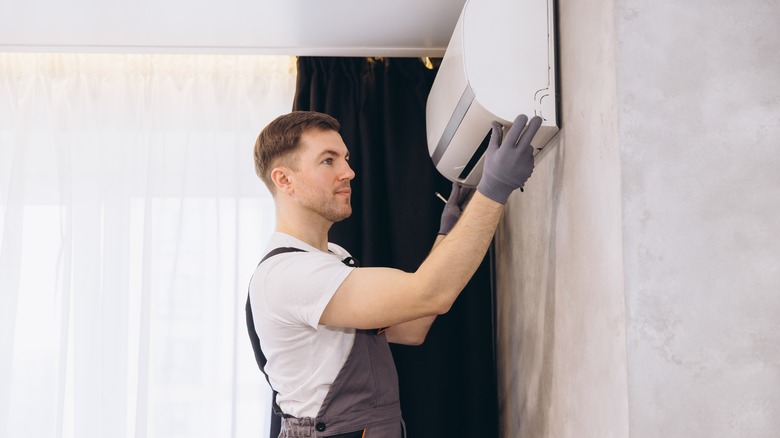The Scary Reason Your House Smells Like Gunpowder (And What To Do About It)
It's said that certain smells can spark particular memories. For example, freshly baked cookies remind you of your childhood, pine always smells like the holidays, and sunscreen reminds you of those relaxing beach trips. But when your home suddenly smells of gunpowder, that is likely not the smell you want to recall (especially inside your house). The truth is, that sharp, acrid smell is less about memories and more about a problem with your heating, ventilation, and air conditioning (HVAC) system. More often than not, the reason is a fried circuit board or an overheating motor. Such issues need immediate attention but are definitely repairable.
People often confuse this burning smell with burned plastic, fireworks, or even sparklers. So, when this smell starts coming from within your house, it's alarming and your mind instantly goes to "explosion." But that's not the actual risk; the reality is mechanical failure.
But just because your house won't blow up doesn't mean you should take this smell lightly. Once a motor or board begins to fail, the problem can quickly shut your system down completely or become irreversible if left untreated. And if the system keeps running, your electricity bill may go through the roof, or you may lose heating or cooling at the worst possible time. So, if you smell gunpowder in your house, your system needs repairing, now!
Next steps and how to prevent this gunpowder smell
What should you do under these circumstances? The first step is clear — turn off your HVAC system completely. Powering it down prevents further overheating and halts excess damage. The next step is to call a licensed technician to check the system. Remember, this is not a DIY repair. If you try to fix it yourself with some guesswork, you could actually make things worse. It's better to call an expert with a trained eye who can quickly identify the problem and fix it.
Prevention, however, is something you have control over. Simple things like cleaning the HVAC system on your own or changing air filters regularly can keep the system from straining and overheating. Keep the area around your outdoor unit clear of plants, furniture, and debris. This will ensure steady airflow and reduce stress on the HVAC system. Annual tune-ups are also important. Once in a while, call a technician to check on the system to tighten loose wires, clean coils, or spot problems before they become dangerous.
Smelling gunpowder in your house is quite unsettling and scary, but consider it a gift in disguise. It's an early warning sign that your HVAC system is giving you, letting you know something is wrong and you need to quickly fix it. Keep up with the maintenance, and you'll avoid bigger problems in the future. And best of all, you'll get back to enjoying the scents you actually want in your home, like freshly baked cookies or anything that makes your space feel truly yours.

